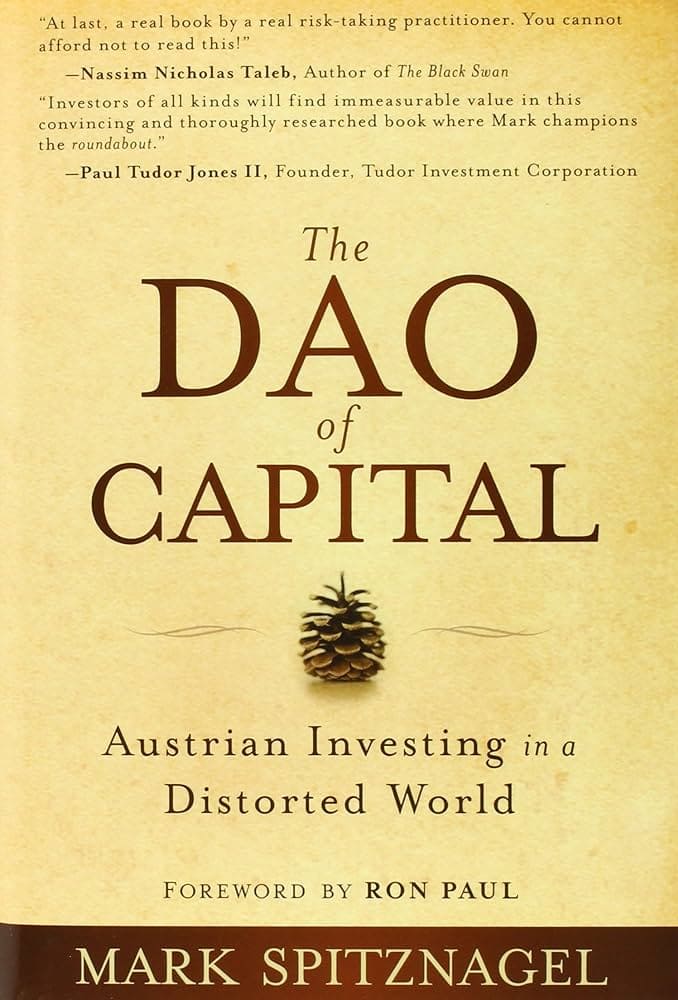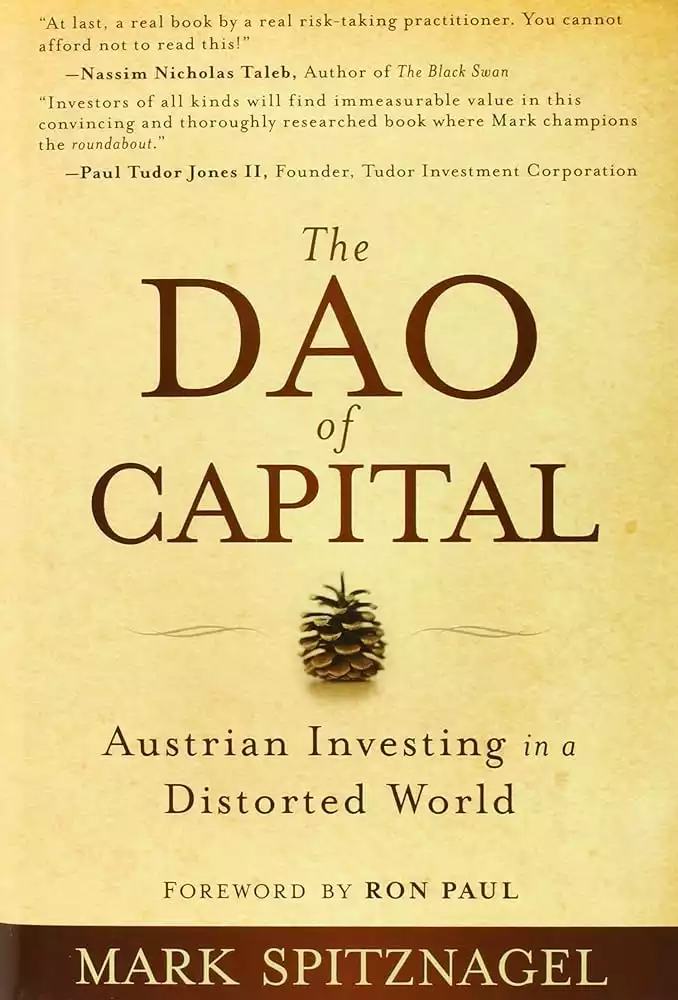Overview : The Dao of Capital Austrian Investing in a Distorted World by Mark Spitznagel
-
Book Title: The Dao of Capital
-
Author: Mark Spitznagel
-
Publication Date: August 2013
-
Rating: 4.5
-
price: $20.72
-
Pages: 368
Author Information
The author of The Dao of Capital by Mark Spitznagel, is a renowned hedge fund manager and strategist known for his expertise in Austrian economic theory and risk management. With a unique perspective rooted in patience and non-linear thinking, he provides insights on investing through a lens influenced by Eastern philosophy and Austrian economics.
Introduction to The Dao of Capital Book
Mark Spitznagel's The Dao of Capital: Austrian Investing in a Distorted World emerges as a thought-provoking guide that challenges conventional wisdom. This comprehensive review explores Spitznagel's unique blend of Austrian economics, Daoist philosophy, and practical investment strategies. The book emphasizes patience, long-term thinking, and indirect approaches to wealth building, offering valuable insights for navigating market cycles and achieving sustainable financial success.
The Dao of Capital Book Summary
Mark Spitznagel, founder of Universa Investments and a seasoned hedge fund manager, presents a compelling case for adopting an Austrian economics perspective in modern investing. The book's central thesis revolves around the concept of "roundabout investing," a patient approach that prioritizes long-term gains over short-term profits.
Key themes explored in the book include:
- The principles of Austrian economics and their relevance to contemporary markets
- The influence of Daoist philosophy on strategic investing
- Critique of central bank interventions and fiat money systems
- The importance of capital preservation and risk management
- The fallacy of relying solely on quantitative analysis in investment decisions
Analysis of Themes
Austrian Economics in Modern Investing
Spitznagel masterfully applies the teachings of Austrian economists like Carl Menger, Ludwig von Mises, and Friedrich Hayek to today's financial landscape. He argues that understanding subjective value and entrepreneurial foresight is crucial for navigating market distortions caused by government interventions and monetary policies.
The Daoist Influence on Investment Strategy
Drawing parallels between Daoist philosophy and investing, Spitznagel introduces the concept of "wu wei" or "non-action" to financial decision-making. This approach emphasizes patience and alignment with market cycles, challenging the prevalent notion of active trading and market timing.
"The Dao of investing is to recognize the unity of all things and events, to perceive the patterns and cycles that govern them, and to position oneself to benefit from these natural tendencies."
Critique of Modern Financial Practices
Spitznagel offers a scathing critique of quantitative models and algorithmic trading, arguing that these methods fail to account for the complexity of human behavior and market dynamics. Instead, he advocates for a more holistic approach that considers historical patterns and economic principles.
Writing Style and Accessibility
Despite dealing with complex economic theories, Spitznagel's writing is engaging and accessible. He employs historical anecdotes and philosophical musings to illustrate his points, making the book appealing to both finance professionals and curious laypeople. However, some readers might find the abstract nature of certain arguments challenging to translate into actionable investment strategies.
Strengths and Weaknesses of The Dao of Capital Book
Strengths:
- Unique perspective combining economics, philosophy, and practical investing
- In-depth exploration of Austrian economic principles
- Thought-provoking critique of modern financial practices
- Emphasis on long-term thinking and risk management
Weaknesses:
- May lack concrete, actionable advice for some readers
- The focus on long-term strategies might not appeal to short-term traders
- Some may find the philosophical discussions overly abstract
The Dao of Capital Related Books
"The Dao of Capital" stands out in the crowded field of investment literature. While books like Benjamin Graham's "The Intelligent Investor" focus on value investing, and Nassim Nicholas Taleb's "The Black Swan" explores unpredictable events, Spitznagel's work uniquely combines economic theory, philosophy, and practical investing wisdom.
Compared to more mainstream investment books, such as "A Random Walk Down Wall Street" by Burton Malkiel, Spitznagel's approach is decidedly contrarian. It challenges the efficient market hypothesis and advocates for a more patient, strategic approach to wealth building.
Highlights from The Dao of Capital Book
Austrian Investing Approach: Focuses on patience, discipline, and understanding market cycles, inspired by Austrian economic principles.
Roundabout Approach: Advocates indirect strategies, emphasizing delayed gratification and compounding long-term gains over immediate returns.
Risk Aversion: Prioritizes preservation of capital and seeks to avoid losses during economic downturns, favoring investments that endure.
Contrarian Mindset: Seeks opportunities in undervalued, overlooked assets when markets are overvalued, aligning with contrarian investing principles.
Focus on Resilience: Emphasizes creating a resilient portfolio that withstands economic distortions and instability.
Natural Growth: Prefers organic, sustainable growth over aggressive, short-term gains.
Conclusion and Recommendation
"The Dao of Capital" is a compelling read for investors seeking a deeper understanding of economic principles and their application to modern markets. While it may not provide quick-fix solutions, it offers a framework for developing a more resilient and thoughtful approach to investing.
This book is highly recommended for:
- Investors interested in Austrian economics and its practical applications
- Those seeking a philosophical perspective on market dynamics
- Readers looking to challenge conventional investment wisdom
- Anyone interested in developing a long-term, strategic approach to wealth building
For those intrigued by Spitznagel's insights, "The Dao of Capital" is available for purchase through various online retailers. Consider adding this thought-provoking work to your financial literature collection to gain a fresh perspective on investing in today's complex economic landscape. In conclusion, this article has provided an overview of the topic at hand.





